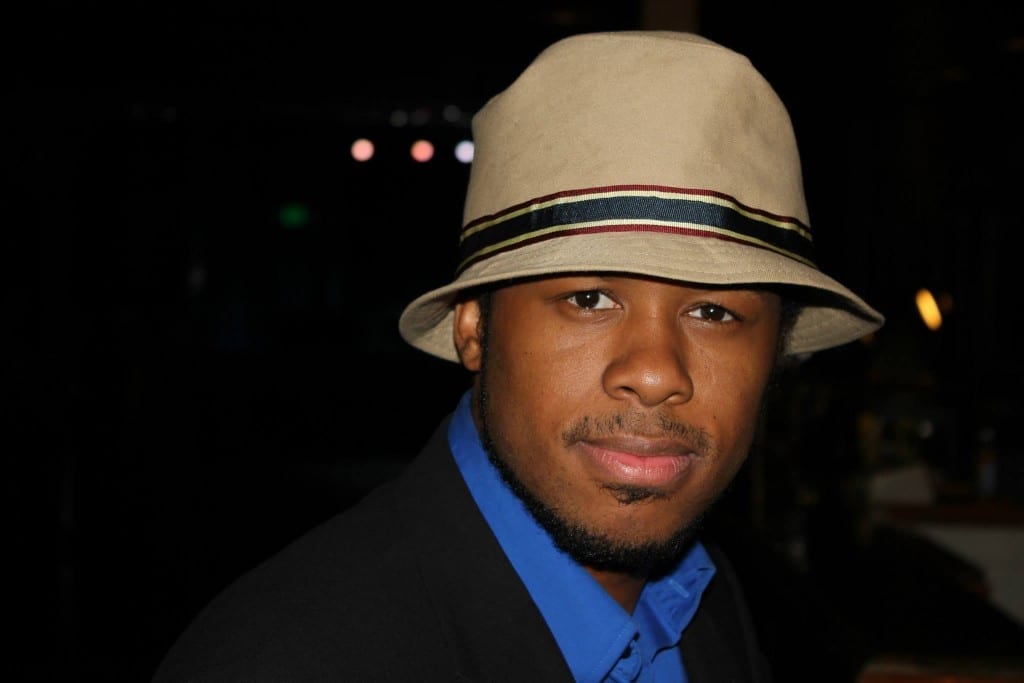How did you find playwriting?

Bluford: In college,we put together a “10 minute play festival.” The plays weren’t half bad and our professor, Larry Dooley, asked a few of us if we’d like to learn about playwriting. He was certified to teach it, but there hadn’t been an interest before. We said yes, and we started learning about and writing plays. I guess that’s where I really started challenging social constructs and trying to find a voice through writing.
What was the biggest inspiration for Mama?
Bluford: My mother. Honestly, I couldn’t get her out of my mind. I think about her often, but I’m pretty busy and I don’t really take enough time to see or speak with my parents on a daily basis. She just wants to know how I am sometimes and loves me a lot. I felt that I needed a better way of explaining why I’m so busy: what I do, and that most of it is to make her proud and show her that I love her. The other inspiration was trying to create something I think David Fetzer would think is cool. I’d like to think he’d think this was cool.
You worked with the late David Fetzer in 2012’s The Third Crossing by Deborah Threedy. Mama is the recipient of an inaugural grant from the foundation created in his honor supporting emerging artists. What does that connection mean to you?

Bluford: A great deal. David was a good guy and great friend. He was also always trying to change the status quo, even if he didn’t exactly have the resources. He was a rebel in that way. He was a fellow fighter in this revolution of trying to keep story telling alive, and he was a friend. A foundation is named after him in an effort to assist other artists to continue to do what he can no longer do. What a beautiful thing. If it were me, I wouldn’t want it any other way. David and I spoke about what theater can be, so the connection means a great deal to me and his legacy will go on.
Through Plan-B, you have been part of several world premiere productions of new plays. Have those experiences impacted or influenced the creation of Mama?
Bluford: Yes, absolutely. Being around new plays gives you insight into what works and what doesn’t. At Plan-B, there is no shortage of talented writers and material, so taking little nuggets of information from the masters here and there does really help. I feel like being at Plan-B allows you to know what will work in that space and what won’t- so, yes, that has been a blessing.
Who or what are some of your other influences as an artist?
Bluford: As far as my writing is concerned, I was really taken by Pinter and Sondheim at a young age. I wrote some Brecht-style plays while in college, so there are my roots I would say. But over the years, to be honest, I would say my roommates. They actually are some of the most imaginative, questioning, and brilliant minds I’ve known. If they were writing constantly and seriously, I believe you’d know their names by now. Also, I love the styles of Jenifer Nii and Matthew Ivan Bennett.
Do you feel like you have a particular writing style? If so, what?
Are there difficulties associated with being a playwright of color in a non-diverse market?
What do you hope audiences take away from Mama?
Bluford: I hope they have a good time and I hope they think about their mothers, good or bad. If people are affected by the piece and walk away with something to think about and have also had a good time, I will consider the play a success.
What is next for you as a playwright?
Bluford: More writing! I’m working on getting a larger scale play I wrote called The Empress of Virginia produced. I’m also working on a play I hope to pitch to Plan-B called The Priesthood. Once that play is complete, I promised myself I’d finish a musical that I started in 2007 called Deep Blue. So, I suppose I’ll work on that next. And many, many more to come.
[box type=”shadow”]The Plan-B Theatre Company world premiere of Mama runs February 12-22, 2015, in the Studio Theatre at the Rose Wagner Performing Arts Center. Performances are Thursday and Friday at 8 PM, Saturday at 4 and 8 PM, and Sunday at 2 PM. Information and tickets at planbtheatre.org.[/box]
